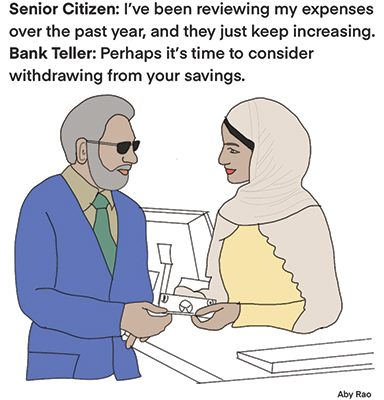
With each passing year, Americans seem to be less prepared for their retirement; that was the upsetting and somewhat unsettling conclusion Fidelity had made from the data collected in one of their recent surveys.
When we are working most of our active lives, say about 40 to 50 years, it is hard to imagine what new things retirement life is going to bring. Generally, there is only excitement about the free time we would have to spend with our family and friends, perhaps travel and many other things we can imagine. And in all fairness, I would assume, we have accumulated enough wealth to take care of all that. This would leave time to may be occasionally gaze at the blue skies and watch the grass grow.
One thing is not often thought about or planned. It is hard to comprehend and get our arms around the fact that our annually increasing income that we were used to is going to stop, sometimes suddenly, and we have to learn to live on our savings and income from savings. Granted there are 401k and SSA, whenever you have decided to start it, and for about 10% to 15% there are pensions, but that has become a disappearing phenomenon and if it is there it is a fixed amount which will not change for the rest of your life.
 What I am getting at is the fact that most of these fixed incomes, with the exception of SSA, which is adjusted for inflation every year now (this is also a fairly recent event) and that is the first surprise we have to get used to. Some interesting statistics put out by the Department of Labor as far as the unexpected expenses are concerned: the average 65-year-old couple will need $315,000 to cover medical costs over their lifetimes.
What I am getting at is the fact that most of these fixed incomes, with the exception of SSA, which is adjusted for inflation every year now (this is also a fairly recent event) and that is the first surprise we have to get used to. Some interesting statistics put out by the Department of Labor as far as the unexpected expenses are concerned: the average 65-year-old couple will need $315,000 to cover medical costs over their lifetimes.
Another one from Fidelity is: the average American aged 65 and older spends $1,993 per year on eating out. There is more about adult diapers and such, but I will not get into that; just know that they are very expensive.
The surprise is that the income stream is now fixed, and we are required to balance that with the expenses that we already have.
One surprising fact that is very hard to digest for many is that the expenses do not go down in retirement. They do change their composition, which means if we were spending more on clothes and shoes and perhaps personal grooming then it may diminish but the travel/pleasure/health expenses may go up.
Generally, 90% of people that I have talked to will say that their total expenses, for sure, will not go down. Hence, we face this music, when we retire, of matching the expenses to the income stream. The one pill that is hard to swallow is that expenses constantly go up, at least by the rate of inflation, but the income stream is fairly steady.
Here are some numbers as to how inflation affects us. At 3% annual inflation general prices will double between 23 and 24 years and at 4% inflation they will double between 17 to 18 years (A gallon of milk will go from $3 today to $6 in that period). That kind of time frame is within a retiree’s lifespan. Now we can appreciate why the Federal Reserve is so adamant to bring the inflation down and keep it there. Their goal being 2% annual inflation while clearly understanding that there will always be some inflation.
Another point driven and derived by the same Fidelity survey was that people in general are saving less and investing more conservatively. This is something that many financial experts and economists would consider as a natural reaction during a financially challenging environment; and that we certainly went through during the Covid epidemic and afterwards. As we have seen in the past and at the present time in many countries like Argentina and Turkey where inflation was rampant, and people tend to spend money now and take possession of goods now because these goods become even more expensive later because of high rate of inflation. Consequently, people tend to save less and whatever investment they wish to make is done conservatively. This attitude, and tendency, is understandable given the COVID years and the tumult we faced afterwards.
Healthcare costs are an event that has no mercy, or any timeframe and we just must brace ourselves to get ready for the worst. It may or may not happen to some, but we should be ready for it. A common misunderstanding is that Medicare will take care of it. And it does take care of many but certainly not all of your healthcare concerns or issues. There is also a monthly premium per person which goes up every year and could go up substantially if our AGI suddenly rises for whatever reason (IRMAA effect).
It is usually for a justifiable reason like buying a car, down payment for something, wedding or any such event for which we would either sell stock or withdraw more from our IRA. It is best, if perhaps not the events themselves, that the expenses for the events are planned ahead of time to avoid extra taxes.
Healthcare costs themselves, the ones we pay out of pocket, do start going up as we mature into oblivion and that needs to be planned but generally is not.
Stock volatility and unrealistic expectations are another area where Fidelity found a gap that was ill conceived by retirees. If not carefully managed, retirement portfolios can get pummeled, albeit temporarily, and we just need to learn how to handle that temporary setback.
Yes, indeed it is temporary but excruciating when it happens and mentally we are not ready or we are not prepared for it. At the end of 2022, S&P was down 19.4%; it happened to be the worst performance since 2008, and many people were not ready to accept that because 14 years in between the two events is a long time and we forget how it needs to be handled.
Over 75% of retirees do invest in the stock market either directly or indirectly and they just have to learn to handle such situations properly and plan for it.
So, there it is folks. Retirement could be a bed of roses but sometimes there are a few rocks and thorns strewn in there somewhere. We just need to know where they are and carefully pluck them out by our judicious actions ahead of negative events.
Mo Vidwans is an independent, board certified financial planner. For details visit, vidwansfinancial.com, call 734-476-0579 or write to: [email protected]



